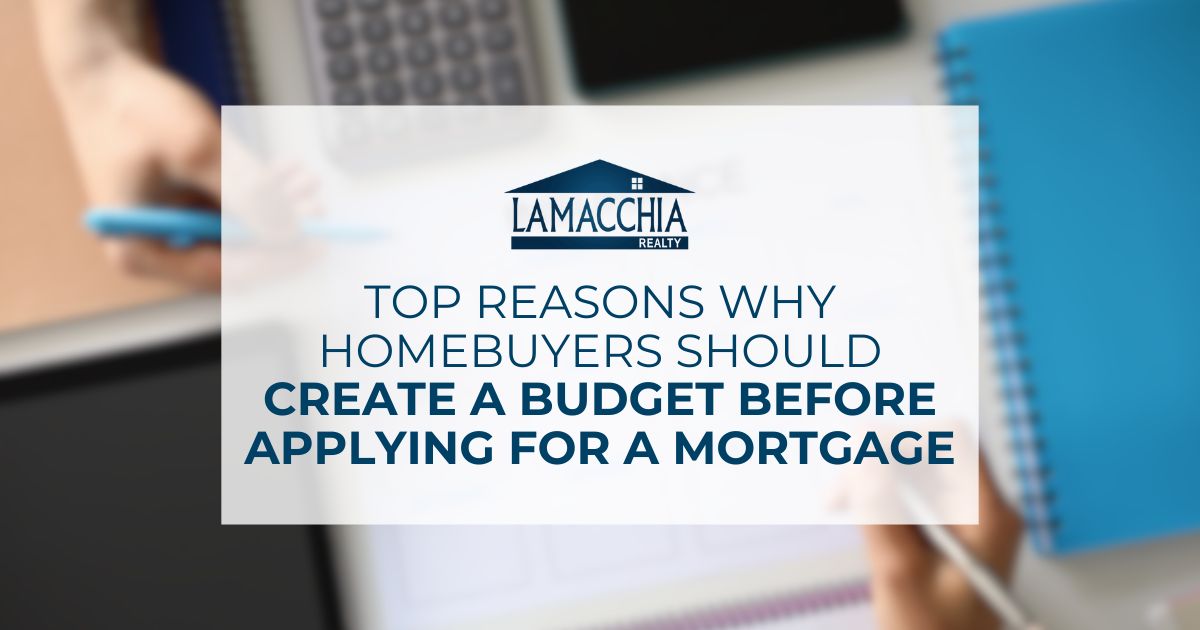
 For many prospective buyers, taking their first step on the property ladder can feel quite daunting in any market. With average housing prices still steadily increasing year over year, and mortgage rates currently sitting at the high 6’s, anyone looking to enter the market could be cautious, especially first-time homebuyers.
For many prospective buyers, taking their first step on the property ladder can feel quite daunting in any market. With average housing prices still steadily increasing year over year, and mortgage rates currently sitting at the high 6’s, anyone looking to enter the market could be cautious, especially first-time homebuyers.
Of course, there are obstacles to overcome for existing homeowners looking to sell their homes and move to a new property, leaving many people feeling a little dejected. However, as has always been the case, some clever budgeting can go a long way in terms of realizing home-buying goals.
You may be familiar with creating budgets for renting, or even the costs associated with the general upkeep of your home, but many prospective homeowners don’t consider the benefits of budgeting for a mortgage. This blog breaks down why skipping this step might be a mistake, and how creating a budget before taking out a mortgage can help you in the long run.
Why Create a Budget Before Taking Out a Mortgage?
Many homeowners may assume they can afford repayments for any mortgage they’ve been approved for, after all, a lender has agreed to offer you the loan. However, your mortgage lender may not be aware of every financial obligation you have, nor will they know what your long-term goals are, two factors that could negatively impact your overall financial health.
By creating a personalized budget before taking out a mortgage, whether it’s for your own home or an investment property, you can account for every aspect of your financial situation. This means you can plan out your long-term commitments while still making sure you have enough money to take care of other expenses.
This is the best reason for homebuyers to create a budget before taking out a mortgage, but let’s take a closer look at the specific reasons why budgeting for your mortgage is beneficial.
 Benefit #1: It Helps You Plan Responsible Repayments
Benefit #1: It Helps You Plan Responsible Repayments
Creating a personalized budget for your mortgage enables you to account for every financial commitment you have. This means you can combine your current and projected living costs with the figures provided by your lender to reliably calculate your actual financial obligations.
Having these figures to hand prior to taking out a mortgage allows you to enter negotiations knowing what you can afford, helping you avoid agreeing to a loan that looks good on paper, but isn’t actually right for you. Further down the line, as you’re enjoying a less stressful start to your home-owning life, you’ll be thankful you planned around responsible repayments.
Benefit #2: It Gives You the Option to Refinance Your Loan
Budgeting for anything allows you to make clever decisions over time, focusing on long-term benefits over short-term enjoyment. This is particularly true when it comes to budgeting for a mortgage, as planning to have extra cash down the line can put you in an enviable position.
Mortgage rates have risen by over 5% since 2021, hitting a peak of almost 8% in 2023, but rates are projected to decline in the coming years. With this in mind, creating a budget before taking out a mortgage now puts you in a better position to refinance your agreement later, giving you financial leverage to make the switch comfortably when rates are more attractive.
Benefit #3: It Can Help You Plan a Timeline of Homeownership
Another good reason to create a budget before taking out a mortgage is that this practice will help you better manage your homeownership journey. Purchasing a home, and by extension taking out a mortgage is one of the biggest financial commitments you’ll make in your life. So, it only makes sense to plan the practical and financial aspects of your journey as much as possible.
Sitting down to create a long-term budget that not only accounts for your bills and mortgage payments but also any work you intend to carry out on the house over time, will help you to comfortably manage your finances far into the future. This exercise can also help you to map out a timeline for home renovations based on your long-term financial expectations or goals.
Tips for Creating a Mortgage Budget
- The 50/30/20 rule: The 50/30/20 rule is central to budgeting for anything, imploring you to manage your income by spending 50% on needs, 30% on wants, and 20% on debts/savings. Following this rule will give you a good idea of your financial position.
- Consider insurance: It can be worth taking out a mortgage life insurance policy if you’re ready to make long-term plans, as this can help your beneficiaries keep hold of your home in the event of your passing.
- Factor in closing costs: Closing costs can be equal to between 2% – 5% of your total loan amount, so make sure to factor this expense into your budget calculations.
- Give yourself a buffer: For long-term planning, make sure to give yourself a buffer that accounts for unexpected costs and the potential for expenses to rise over time.
Ready to Become a Homeowner? Contact Me Today!
 Whether you’re ready to purchase your first home, or looking to sell your home due to a life change, I can help you find the perfect house for your needs and budget. I understand that every buyer’s situation is unique, and I am committed to guiding you through every step of the process—from understanding your financial goals to helping you make informed decisions. With a solid budget in place, you can feel confident in your home search, knowing that you’re prepared for what lies ahead. Let me help you turn your homeownership dreams into a reality with a plan that’s built for success.
Whether you’re ready to purchase your first home, or looking to sell your home due to a life change, I can help you find the perfect house for your needs and budget. I understand that every buyer’s situation is unique, and I am committed to guiding you through every step of the process—from understanding your financial goals to helping you make informed decisions. With a solid budget in place, you can feel confident in your home search, knowing that you’re prepared for what lies ahead. Let me help you turn your homeownership dreams into a reality with a plan that’s built for success.
